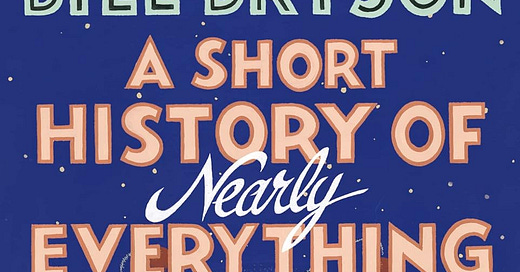Bill Bryson's A Short History of Nearly Everything takes readers on an extraordinary journey through time and space, exploring how we went from the Big Bang to the rise of human civilization. With his trademark wit and accessibility, Bryson tackles complex scientific concepts by focusing on the eccentric, brilliant, and sometimes forgotten scientists who made breakthrough discoveries.
The book begins with cosmology, vividly describing the unimaginable violence of the Big Bang and the formation of our universe. Bryson illustrates the vastness of space by asking us to imagine Earth as a pea, making Jupiter a ball and the Sun a beach ball—with Pluto nearly half a mile away. He delights in revealing how the weight of Earth was first calculated by Henry Cavendish, a scientist so painfully shy he communicated with his housekeeper through notes.
Moving to geology, Bryson chronicles how we discovered Earth's true age—4.55 billion years—overturning Biblical calculations that placed creation at precisely 9:00 a.m. on October 23, 4004 BCE. He recounts how Alfred Wegener's continental drift theory was ridiculed for decades before plate tectonics finally vindicated him. The dramatic story of Marie Tharp mapping the Mid-Atlantic Ridge from a small office at Columbia, proving seafloor spreading while being dismissed because of her gender, exemplifies Bryson's focus on overlooked scientific heroes.
The evolution of life receives equal attention, from primordial soup to complex organisms. Bryson marvels at extremophiles thriving in boiling hot springs and deep-sea vents, suggesting how tenacious life can be. He describes the many extinction events that have reset life's progress, including the asteroid impact that wiped out dinosaurs, leaving a crater in Mexico's Yucatán Peninsula that wasn't discovered until 1980.
Throughout, Bryson emphasizes the fragility of human knowledge. When the Library of Alexandria burned, we lost works by Aristotle and countless others. Similarly, he notes how James Hutton's groundbreaking geological theories were nearly forgotten because his writing was so impenetrable.
The book's grand achievement is making science thrilling by focusing on the human dimension—the rivalries, mistakes, persistence, and occasional strokes of luck behind major discoveries. One moment we're with Charles Walcott discovering the Burgess Shale fossils after his horse stumbled on a rock; the next, we're watching Einstein develop relativity while working as a patent clerk.
Bryson leaves readers with a profound appreciation for both scientific achievement and our precarious existence. We are, as he reminds us, standing on a planet that is just the right distance from a star that provides just enough energy, protected by a magnetic field and atmosphere that shield us from cosmic radiation—a series of fortunate circumstances that have allowed us to evolve and, remarkably, begin to understand our own origins.
Get the book : USA | India | UK
Check out the previous books we’ve covered:





Feb 25 is my 🎂 Thanks for reminding me I have this book on my shelf. Time to pick it up again! I ❤️ Bill Bryson 📖